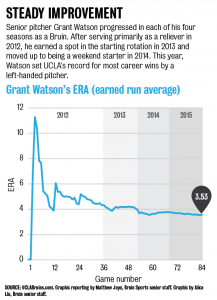Midway through his first appearance in the College World Series, pitcher Grant Watson took a look up at the scoreboard in TD Ameritrade Park.
In that moment, the then-sophomore caught his first glimpse of what he was really up against.
“I look up at the giant scoreboard that they have and I see like one of their guys is batting like .340 and I was like, ‘Oh,’” Watson said.
Watson just so happened to be facing the No. 2 offense in the country that day and the No. 1 overall seed in the 2013 NCAA Tournament: North Carolina. The stadium was filled with the largest crowd Watson had ever played in front of – nearly 26,000 people.
This was a far cry from home for Watson. The Bakersfield native rarely saw more than 100 people at his high school games, let alone any scouts.
“Where I was from, there’s good competition, but you never feel like you’re gonna be a standout guy as far as going somewhere,” Watson said. “There wasn’t much … scouting being done.”
Yet on that June 2013 night, Watson pitched as if he’d never left home. He didn’t allow the change in atmosphere take him away from his own game.
“I wouldn’t say I get too hyped up, because when I do try to get too hyped up, I’m not myself out there,” Watson said. “I just try to keep it like more of a relaxed type.”
Watson stood before the flashing cameras and radar guns and didn’t bat an eye. He pitched six scoreless innings against the Tar Heels, leading the Bruins to a 4-1 win. The victory earned UCLA its second trip to the NCAA championship series.
“I think he showed the whole country that he can pitch in a big stage,” said UCLA coach John Savage after that game. “We know how good Grant is. He’s been a big reason why we’re here.”
Nearly two years later, Watson is ending his career with a distinct mark in the UCLA baseball program’s history: the most wins ever recorded by a left-handed pitcher, 30. Yet even today, the senior said he still looks back on that win against North Carolina as one of his defining moments as a Bruin.
“UNC in Omaha, like you can’t take that experience away – if it had been a win or a loss,” Watson said.
Watson’s path to starting in Omaha, Neb., for a national championship-winning team was never a given. In high school, he said he had to travel outside of his hometown in Bakersfield just to get exposure in front of scouts. He sought out showcase camps via Perfect Game, which focuses on youth-player development throughout the country.
“For a player like Grant Watson … he’s from a smaller town and won’t be getting the exposure – and that’s what we provide for young players,” said Patrick Ebert, the managing editor of Perfect Game.
At one of the regional camps hosted by Perfect Game, Watson caught the eye of Savage, who offered Watson a spot as a preferred walk-on in 2011.
Watson took the offer, but would need to prove himself on a bigger stage in order to earn a scholarship.
“I had to catch up to the speed (of college baseball) if (Savage) wanted to use me,” Watson said. “I don’t think I was expecting (the scholarship) for sure.”
Watson’s transition to college wasn’t without some hiccups. In his first appearance against a ranked team – then-No. 25 Baylor – Watson allowed six runs in 2.2 innings, causing his ERA to skyrocket to 11.24. Then, after a few solid outings dropped Watson’s ERA to 3.86, he allowed nine runs in under two innings against Washington State.
“My freshman year, I remember the games where I got pounded as far as giving up seven runs in two innings,” Watson said. “Just like learning from that.”
After those experiences, Watson began a steady ascent in UCLA’s highly regarded pitching hierarchy. He went from being a spot starter for midweek games as a freshman to a scholarship player and Sunday starter as a sophomore. Then, as a junior, he moved up to the starting role on Saturdays. Watson held that same role this year, serving as the No. 2 starter on a Bruin pitching staff that finished No. 1 in the country in ERA.
“I kept that drive through the years to continually get better,” Watson said. “I started as a Tuesday (starter), and I wasn’t satisfied with that. Then it was Sunday, and (then) Saturday.”
Watson pointed to one thing that kept him going all along: the prospects for upward mobility in the UCLA program. The Pac-12 and UCLA specifically have a rich history in producing Major League Baseball pitchers; Watson said he never saw this kind of opportunity growing up in Bakersfield.
“When I got the opportunity (at UCLA), that’s when it started dawning on me: If I continue to improve, I actually could have a chance (at being drafted),” Watson said.
After producing a career-best 2.30 ERA and first-team All-Pac-12 honors in his senior season at UCLA this year, Watson believes there’s a chance that he’ll one day play in front of a crowd that’s even larger than the 26,000 in TD Ameritrade Park.
“I’m assuming, at least somewhere, I could get drafted,” he said. “I’m gonna have my degree (in environmental studies). … I wanted to get my degree so I could go out there and try my dream out, see how it goes.”

